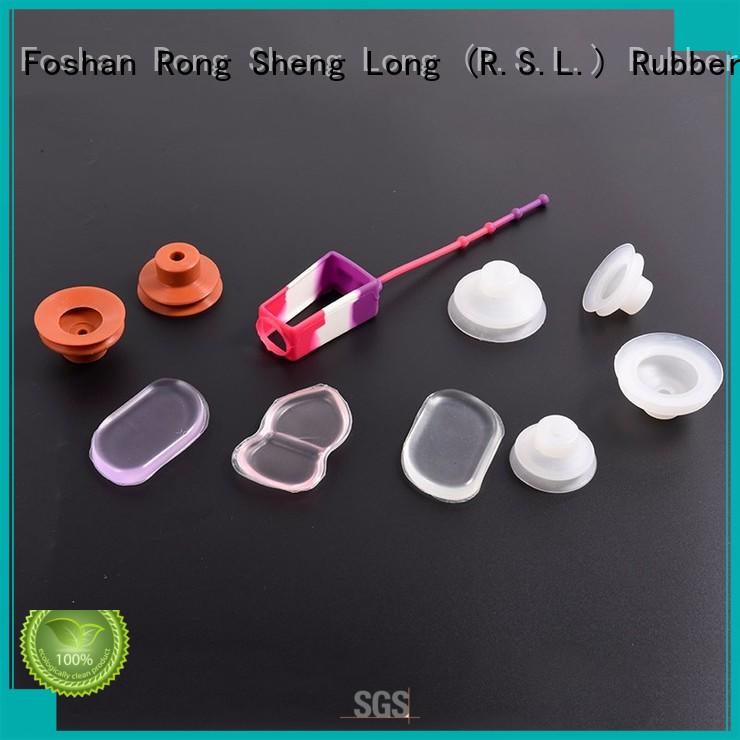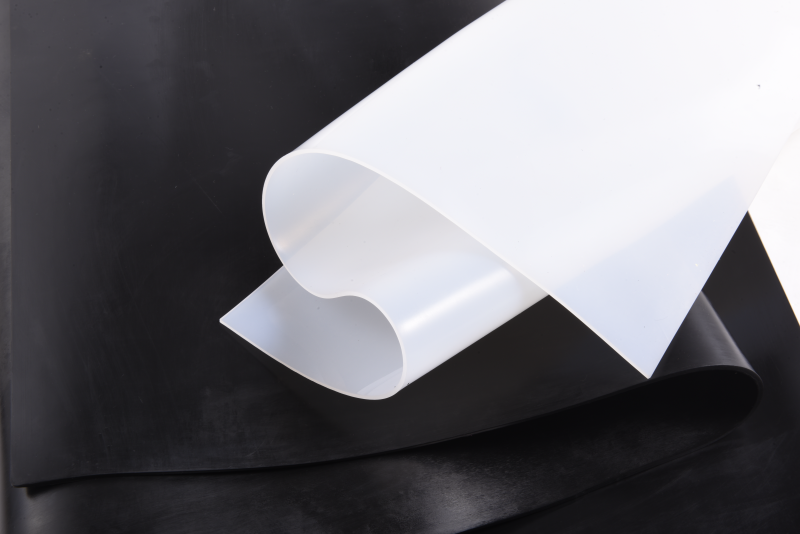
Silicone seals part
- Brand:R.S.L.
- Model:Custom model
- Minimum:100pcs
- Material:Silicone Rubber
- Payment:L/C or T/T
R.S.L. silicone seals parts are used in medical, electronic, military, food processing, and transportation-related applications. Because of silicone rubber’s temperature stability, these elastomers are great for high-temperature gaskets and low-temperature gaskets. Non-toxic, chemically-inert silicone is also a good choice for sanitary applications.
However, silicone rubber gaskets and silicone rubber seals are less resistant to oils, fuels and hydrocarbons. Silicone gasket material is odorless and tasteless, so there are compounds that can be used in surgical and food processing applications.
The standard thickness of silicone rubber ranges from .010" to 1" thick. Silicone rubbers hardness (durometer) typically spans from 30 to 80 durometer
Silicone gasket types can be categorized is a variance of ways: solid silicone gaskets, sponge silicone gaskets and foam silicone gaskets.
Silicone Gasket Advantages:
Silicone gaskets are made from silicone rubbers, a family of synthetic elastomers.
Provides environmental sealing
Offers excellent temperature stability
Resist ozone, sunlight, weathering, and aging
Chemically inert
Good dielectric properties
Maintain their flexibility at low temperatures
Can withstand high temperatures
Solid Silicone Gaskets:
Solid silicone gaskets are made of solid rubber materials with a tightly-packed molecular structure.
They have lower durometers (hardness) and compression rates than sponge silicones
Not all solid silicones are "soft", however
Lower-durometer solid silicones provide strong environmental sealing with low closure force
Solid silicone gaskets with mid-range durometers require greater closure force
Sponge Silicone Gaskets :
Sponge silicone gaskets are made of sponge-like silicone compounds that provide cushioning and padding. Interstate die cuts both basic types of sponge silicone materials: open-cell and closed-cell.
Open-cell silicone gaskets contain interconnected pockets that, unless the gasket is compressed, allow water, chemicals, and air to pass
Closed-cell silicone gaskets are filled with nitrogen gas to prevent the passage of these substances at low pressures
Foam Silicone Gaskets:
Foam silicone gaskets are made of soft, medium, firm, or extra-firm silicone grades for different amounts of compressibility.
They have a lower compression set than sponge silicone gaskets
Offer improved flame resistance

Silicone seals part
Silicone sheet gasket material is a very versatile material ideal for a wide range of applications. Silicone rubber gasket material offers temperature resistance, weather (UV and ozone) resistance, and fire resistance . Silicone gasket material has very good compression set resistance allowing it to maintain a proper seal over many years.
Silicone gaskets offer exceptional high and low temperature capability while maintaining excellent flexibility. Normally manufactured by molding or die cutting of sheet stock. Silicone rubber offers the advantages of lower molding pressures compared to organic rubber, as well as low toxicity and low odor.
Silicone gasket material is not recommended for dynamic applications due to it's poor tear strength and tensile. It does not do well with oils. It does however do well in most gasketing (static) applications and seals at lower bolt loads than most rubber materials due to it's low durometer.
The temperature range on most silicone gasket materials is -80o F to +450o F
However, silicone rubber gaskets and silicone rubber seals are less resistant to oils, fuels and hydrocarbons. Silicone gasket material is odorless and tasteless, so there are compounds that can be used in surgical and food processing applications.
The standard thickness of silicone rubber ranges from .010" to 1" thick. Silicone rubbers hardness (durometer) typically spans from 30 to 80 durometer
Silicone gasket types can be categorized is a variance of ways: solid silicone gaskets, sponge silicone gaskets and foam silicone gaskets.
Silicone Gasket Advantages:
Silicone gaskets are made from silicone rubbers, a family of synthetic elastomers.
Provides environmental sealing
Offers excellent temperature stability
Resist ozone, sunlight, weathering, and aging
Chemically inert
Good dielectric properties
Maintain their flexibility at low temperatures
Can withstand high temperatures
Solid Silicone Gaskets:
Solid silicone gaskets are made of solid rubber materials with a tightly-packed molecular structure.
They have lower durometers (hardness) and compression rates than sponge silicones
Not all solid silicones are "soft", however
Lower-durometer solid silicones provide strong environmental sealing with low closure force
Solid silicone gaskets with mid-range durometers require greater closure force
Sponge Silicone Gaskets :
Sponge silicone gaskets are made of sponge-like silicone compounds that provide cushioning and padding. Interstate die cuts both basic types of sponge silicone materials: open-cell and closed-cell.
Open-cell silicone gaskets contain interconnected pockets that, unless the gasket is compressed, allow water, chemicals, and air to pass
Closed-cell silicone gaskets are filled with nitrogen gas to prevent the passage of these substances at low pressures
Foam Silicone Gaskets:
Foam silicone gaskets are made of soft, medium, firm, or extra-firm silicone grades for different amounts of compressibility.
They have a lower compression set than sponge silicone gaskets
Offer improved flame resistance

Silicone seals part
Silicone sheet gasket material is a very versatile material ideal for a wide range of applications. Silicone rubber gasket material offers temperature resistance, weather (UV and ozone) resistance, and fire resistance . Silicone gasket material has very good compression set resistance allowing it to maintain a proper seal over many years.
Silicone gaskets offer exceptional high and low temperature capability while maintaining excellent flexibility. Normally manufactured by molding or die cutting of sheet stock. Silicone rubber offers the advantages of lower molding pressures compared to organic rubber, as well as low toxicity and low odor.
Silicone gasket material is not recommended for dynamic applications due to it's poor tear strength and tensile. It does not do well with oils. It does however do well in most gasketing (static) applications and seals at lower bolt loads than most rubber materials due to it's low durometer.
The temperature range on most silicone gasket materials is -80o F to +450o F






